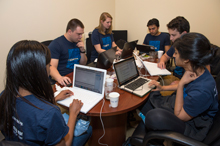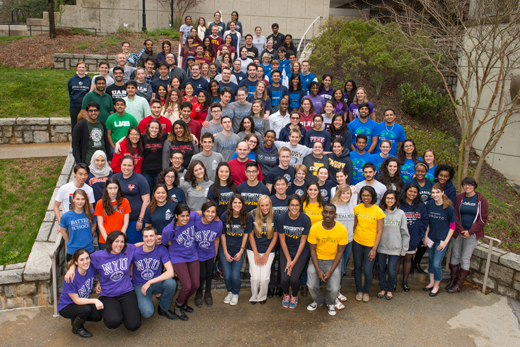On March 29, the Emory Global Health Institute (EGHI) hosted 24 student teams from universities around the world to participate in its 2014 International Emory Global Health Case Competition. EGHI has been hosting global health case competitions since 2009, and the weekend's event was its third international competition.
This year, teams developed recommendations for reforming the World Health Organization (WHO). Founded in 1948 as a special agency for the United Nations, the WHO has had numerous public health successes including the global eradication of smallpox.
However, it has received recent criticism for its politicized and bureaucratic funding structure. In 2010, the WHO's Director General began reform discussions specifically as they related to the WHO's financing. Case competition participants grappled with the complex organizational and political issues the WHO faces to develop reorganization plans that would ensure it successfully meets the emerging health issues of the 21st century.

Winning team members work in their strategy to improve the World Health Organization infrastructure for the Global Health Case Competition. Photo courtesy of the Emory Global Health Institute.
Both the First-Place Award and the Participants' Choice Award went to the University of Texas (UT) Southwestern Medical Center, which proposed reforming WHO donor processes and expanding the WHO's Executive Board to include NGOs, national public health institutes, and faith-based organizations.
"I really enjoyed the case topic. I didn't have any public health experience coming in beforehand, so I was a little nervous we would get a topic where I wouldn't be much help to the team. Instead, the 'WHO of the 21st Century' case was almost a relief. While the task at hand was enormous, the strategy aspect really allowed our team to use our business knowledge in the organizational approach and then leverage our medical knowledge on specific initiatives the WHO could implement," says Jane Slusher a UT Dallas Jindal School of Management student.
Teams came from Australia, Canada, Sweden, and across the United States to participate in this year's competition. Johns Hopkins University placed second, the University of Alberta placed third, and the University of Minnesota received honorable mention. Icahn School of Medicine at Mount Sinai University won the competition's Innovation Award, which recognized a team for its out-of-the-box thinking.
"I was very impressed by the caliber of the teams, and it was an honor to judge the competition. This case was extremely complex, yet those who excelled communicated their strategies simply. The students clearly learned a lot during the event, and I am sure we will soon see them as leaders in global health," says David Barash, Chief Medical Officer for the GE Foundation, which sponsored the competition.
"This is a life changing experience for students in terms of preparation for careers in global health because of the incredible exposure, learning, and networking opportunities. Putting together a presentation in such a short amount of time for such a complex, real-life case brought out the best in our students. Some of them had exams Thursday morning before we got on the plane. They demonstrated incredible preparation skills, professionalism, and resilience. The feedback from the judges was very insightful and will help students with their future career planning as well. I want to thank Emory for the wonderful opportunity to participate and for its dedication to making all of the students and their mentors feel at home. Emory rocks!" says Lillian Niwagaba, Director of Education Programs at the UT Southwestern Office of Global Health.
For more information about the Emory Global Health Case Competitions, visit the Emory Global Health Institute's website.

